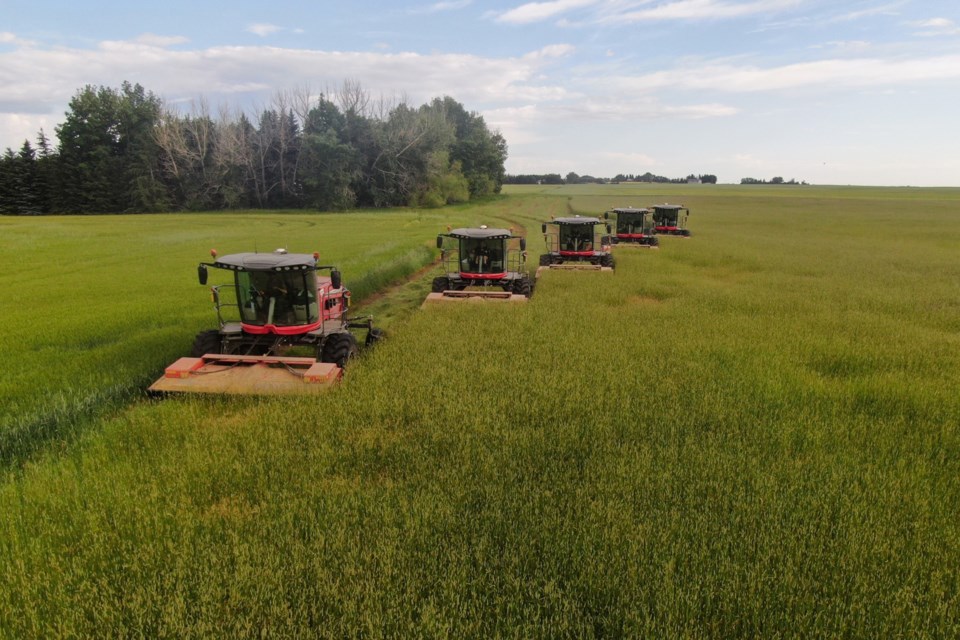MOUNTAIN VIEW COUNTY — A lockout of employees at two of Canada’s railway companies will devastate not only a local grain and hay shipping company and its employees, but also the wider economy, its president says.
The Canadian National Railway (CN) and the Canadian Pacific Kansas City (CPKC) are both in negotiations with the Teamsters Canada Rail Conference union.
When an agreement wasn't reached, the employees were locked out by both companies just after midnight, Aug. 22.
The union has been demanding better wages and benefits for workers, as well as better crew scheduling.
CPKC announced embargoes for all shipments originating in Canada effective as of Aug. 20, which means stalled freight trains across Canada.
Barr-Ag Ltd., located in Mountain View County in the Olds area, handles and ships Canadian grain and hay to markets around the world. It has about 50 employees in Olds and area and another 10 or so in Calgary.
Barr-Ag president and owner Barry Schmitt says the strike would be devastating for the business and its employees, as well as other spin-off businesses, including trucking.
“This is a new crop season, so we're trying to get the first shipments to Japan and so of course we're not going to get them (there),” Schmitt said during an interview Tuesday.
“We have a grain farm and so new deliveries are being called for now off that combined harvest,” Schmitt said. “We harvest in July, now we're shipping in August. The terminals will fill up real fast and there'll be no train movement.
“We tried everything, you know,” he said. “We hired extra trucking companies to get more containers to the ports last week and the week before, and just trying to get (the product out).
“But it's pretty devastating when they shut down your your lifeblood.”
Schmitt predicted the lockout could have ramifications beyond the agriculture industry.
“(If) this starts backing up, the whole system around the world will start backing up,” he said.
Schmitt said the world of grain and hay shipping has been “horrible” for the past few years.
First there were the COVID-19 pandemic shutdowns, then a giant ship ran aground in the Suez Canal, blocking shipping and forcing ships to take much longer far more expensive routes to market, resulting in “skyrocketing” shipping rates.
Those rates just started to come down when the war in Gaza broke out and the Houthis started firing weapons at ships, thus raising shipping rates again as shippers avoided the Suez Canal.
Then the fire in Jasper forced CN to shut down railway operations there.
“So just one thing after another and this will be devastating, because it looks like it's the battle lines are set and with no-back-to work legislation being available it could go on for a long time,” he said.
Meanwhile, said Schmitt, customers won’t just wait for the work stoppage to be settled, they’ll look at obtaining product from American suppliers, who will be only too happy to provide it.
It could take a long, long time to get those suppliers back, once the problem is resolved, one way or another, he added.
“The Americans will have a free reign shipping into our markets and taking our customers. It took years to get these relationships.”
The provincial government has echoed Schmitt’s concerns.
Jobs, Economy and Trade Minister Matt Jones and Transportation and Economic Corridors Minister Devin Dreeshen issued a joint statement on the impending work stoppage, calling for “immediate action” to address the matter.
“If negotiation agreements between each of the railways and workers represented by the Teamsters Canada Rail Conference cannot be reached and workers are locked out, work stoppages at the railways will effectively shut down Canada’s rail network and vital supply chains,” Jones said.
“These continuous strikes are eroding Canada’s reputation around the world as a reliable trading partner. The federal government must fix the labour problems it has created and exercise its responsibility to ensure labour stability within federally regulated transportation workplaces,” Dreeshen said.
Schmitt said his company will do its best to keep its employees working but he expressed concern over what decisions might have to be taken if the work stoppage lasts a long time.
“We’ll compress and stockpile as much as we can try to keep everyone employed and do what we can. But eventually we have no markets and the (work stoppage) goes on,” he said. “We'll have to do something.”
Schmitt echoed concerns raised by other business people that for every day the work stoppage lasts it will take several days to recover.
“I've been at this for a long time and I've been through a few strikes and it's never, never a positive thing for exporters,” he said.
Schmitt said during a previous railway strike when Stephen Harper was prime minster, the railways were declared an essential service, so employees were back to work in a couple of days.
He said if Barr-Ag’s products were trucked to port they might still go nowhere as unions there support the railway workers.
“They're just shutting down the country and going to hold (it) ransom ‘till they get what they want,” he said.
- With files from Masha Scheele



